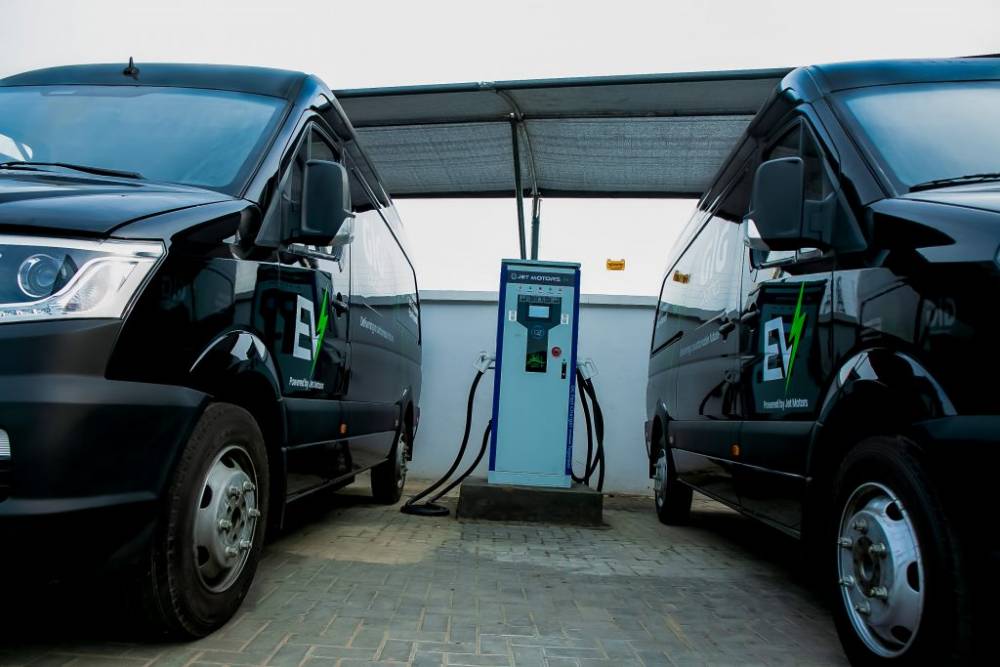
Can JET Motor Company Accelerate The Adoption Of Electric Vehicles In Africa
Can JET Motor Company accelerate the adoption of electric vehicles in Africa by becoming Africa's Tesla?
“Our ultimate goal is to build the Tesla of Africa.”
These were the words of Rupani Sanjay, Director of Sales and Marketing at Nigerian automobile company JET Motor Company, in an interview with Techpoint Africa in 2020, when the company announced a $9 million funding round to build Africa's first all-electric vehicle.
A little over a year later, in June 2021, the company announced a partnership with Nigerian logistics behemoth GIG Logistics (GIGL) to launch the country's first all-electric cargo van, the JET EV.
JET Motor Company was founded in 2018 by Chidi Ajaere, Chairman, GIG Group, and a team of automotive experts with the mission of ushering Africa into a new era of mobility.
The company has now launched JET EV, the country's first all-electric vehicle capable of zero-emissions operation on Nigerian roads.
The JET EV
After approximately three years of research, testing, and iterative development, the company has finally accomplished its primary objective — to manufacture all-electric vehicles from the start.
According to Ebuka Uchendu, Technical Lead, JET EV, the vehicle can travel between 260 and 280 kilometers on a single charge, though it is capable of 300 kilometers. According to him, the EV reduces the number of engine components by nearly 70%, lowering maintenance costs. Operational costs — such as refueling — are also significantly reduced.
“If you look at the cost of fueling a vehicle for 250 kilometers, you'll notice that maintaining an EV is less expensive. For instance, if you look at current electric company billing rates, you can charge an EV to full capacity for 6,000 while fueling a vehicle in Nigeria for 250 kilometers costs between 10,000 and 15,000,” Uchendu says.
The EV is equipped with a high-capacity lithium-ion phosphate battery rated at 107.6kwh and a traction motor rated at 950Nm, which enables the vehicle to accelerate from 0 to 100 kilometers per hour in less than 20 seconds.
Additionally, it includes a supercharger capable of fully charging a 107.6kwh SOC (state of charge) battery in less than two hours.
The African Experience
However, there are concerns about the high entry cost and epileptic power supply.
According to Ajaere, the initial targets are fleet operators — transportation companies such as ABC and GIG Mobility — as well as schools and governments.
“Over time, fleet operators suffer significant losses. Therefore, while the initial cost of entry may be high, if you consider it from the perspective of a fleet operator with ten or twenty vehicles, two significant costs would be vehicle maintenance and petrol costs.
“However, with an EV, you can practically eliminate that cost entirely because you are not using petroleum and your maintenance costs are near zero. Thus, while EVs are superior in terms of maintenance over both long and short periods of time, the initial cost of entry is higher,” Ajaere concludes.
In terms of power supply, he notes that each fleet operator has a variety of options, including solar, wind, and diesel.
“Assume I am a fleet operator with twenty gasoline-powered vehicles,” Ajaere continues, “I am required to put petrol in those vehicles. However, if I own a 100KVA generator, all I need to do is power it and charge my fleet. Even if I emit CO2 through my diesel engine, I do so solely through my diesel engine. I do not have twenty vehicles polluting the road. The point is that your vehicle can be charged via any power source.”
However, the company has begun constructing charging stations for its partners.
“With our existing partners, we are actually building these stations for them as they acquire the fleet.”
However, the long-term goal is for JET to build solar or wind-powered stations across the board as it attracts more partners and venture capital funding.
The African EV industry is competitive. Apart from JET, Siltech manufactures electric bikes, patrol vehicles, and even agricultural utility vehicles in Nigeria.
In Kenya, ARC Ride has launched two- and three-wheeler delivery vehicles that are used by companies such as Uber Eats and Kibanda Top Up. Ampersand has introduced an electric motorcycle taxi fleet in Rwanda, operating as a sort of Uber while maintaining ownership of the vehicles.
Kiira Motors, which has been manufacturing electric buses and cars in Uganda since 2011, already ply the country's roads.
Despite these advancements, Africa remains woefully underrepresented. Ajaere believes JET Motor Company is well-positioned to reverse this trend with vehicles designed specifically for the continent's poor roads and humid climate.
Nigeria's automotive industry, like the fintech sector, has seen its share of interesting policies, and Ajaere reiterates his views on Africa's policy outlook.
“You can have great ideas, but every great company had funding and policies in place that compelled them to make these vehicles widely accessible.
“If countries like Ghana and Nigeria maintain favorable policies, we should be able to export these vehicles not only within Africa, but also across its borders within the next decade or so,” Ajaere concludes.
What awaits us in the future?
In two words: African hegemony. Additionally, the company is seeking funding from venture capitalists and angel investors with a similar mindset and interest in renewable energy.
Apart from that, JET Motor Company intends to build passenger lines despite its current focus on mass transportation.
There are also plans to innovate in the field of battery swapping technology.
“Our expansion strategy is to rapidly secure the necessary funding and literally plant charging stations across African cities and highways, making it easier for both individuals and businesses to adopt EVs, as they are more likely to purchase an EV if they know they will have access to charging stations,” Ajaere says.

